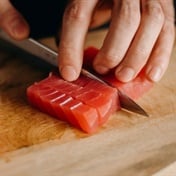
The British Public Health Laboratory, which analysed reports of food poisoning incidents, pinpointed chicken dishes and food made with raw egg as the biggest culprits.
The bacteria which commonly cause food poisoning such as Salmonella, Escherichia coli and Listeria need a good growth medium, the right pH and warmth to grow prolifically. A good growth medium is one that supplies the organisms with plenty of protein. Raw or undercooked chicken and poultry, eggs and milk are perfect to make these organisms happy.
pH refers to the amount of acid the growth medium contains. Low acid contents make the organisms grow, while dishes that have a high acid content, suppress growth. Humans have been preserving their food by lowering the pH or increasing the acid content with vinegar for centuries. However, most festive dishes like chicken pie or custard don’t contain vinegar or lemon juice and have a neutral or high pH, which makes bacteria flourish.
And then there is heat. Bacterial cultures in the laboratory grow best at body temperature, i.e. 37 degrees Celsius. During summer in South Africa ambient temperatures soar and a dish which was prepared a day in advance, kept in the fridge for a while and then put out on the table on the patio or in a marquee will easily heat up to just the right temperature to encourage bacterial growth.
Imagine a festive spread that was prepared ahead of time, and then arranged attractively in hot, humid surroundings and you will understand that chicken pies, custard dishes and even turkey stuffing are potential incubators.
How to avoid poisoning your guests
If you want to avoid poisoning your guests this summer, you need to take some basic precautions:
- Avoid making pies of all description (except fruit mince pies laced with brandy), and dishes that contain raw eggs (egg flip, Zabaglione, home-made custard, eggnog)
- Buy only completely fresh ingredients and freeze prepared dishes rather than to keep them in the fridge for a few days
- Never defrost raw food and then refreeze - this is risky at the best of times, but even more so in summer
- Make sure that meat and milk dishes are cooked right through - raw areas in large roasts and turkeys are excellent breeding areas for bacteria
- Never place food on tables in hot rooms, on patios or in marquees hours ahead of time. Take the food out of the fridge just before it's to be eaten - your guests won't mind waiting a few moments. A slight delay is better than getting poisoned.
- If you feel you cannot cope unless you cook food in advance, then either change your menu to include simpler dishes or invite fewer guests
- Be meticulous when working with raw meat, poultry, fish, shellfish, eggs and milk. Wash your hands and all utensils, including the cutting board, when you have finished working with one type of food before you start on the next. This will prevent cross-contamination. Check that your helpers are doing the same, especially washing their hands regularly, as this is one of the most efficient ways of combating E. coli infections.
- Stick to simple dishes that can easily be accommodated in your fridge. Don’t make such a variety of food that you overload the fridge either - check the thermostat to ensure that food is being kept cold. - (Dr I.V. van Heerden, DietDoc)




 Publications
Publications
 Partners
Partners











